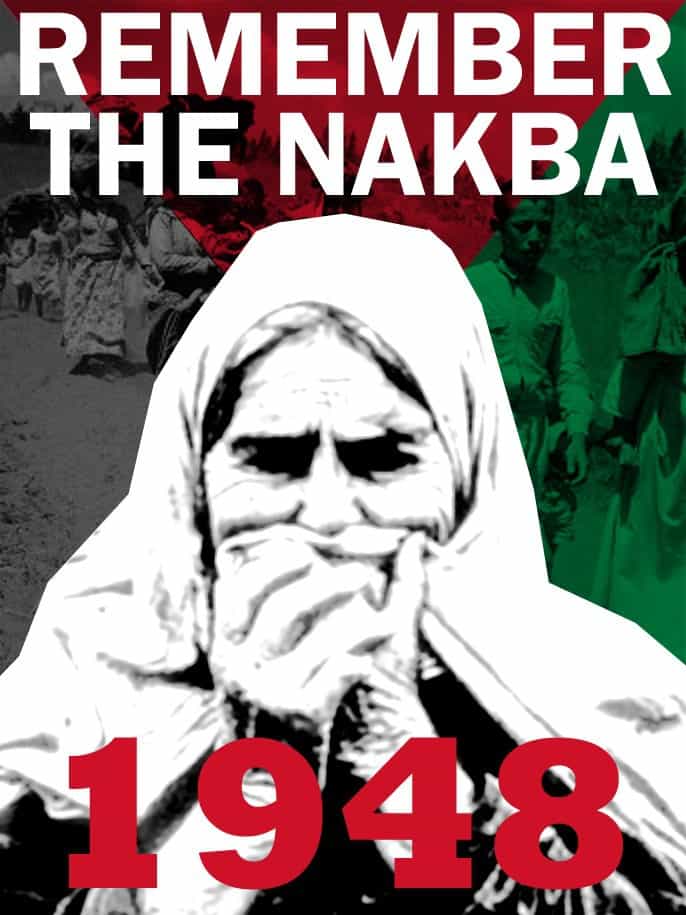Ilana Sumka lives in Belgium and is an educator, writer and activist working to end the Israeli occupation.
Jordy Silverstein lives in Australia and is an historian and writer, and author of Anxious Histories: Narrating the Holocaust in Jewish Communities at the Beginning of the Twenty-First Century (Berghahn, 2015).
Sahar Vardi is a Jerusalem based activist.
Originally published in Jewschool.
To those who refuse to speak about the Nakba,
We’re writing to ask you to reconsider your position. While you may think that narrating a story of the creation of Israel which avoids the truth about history is in the best interest of the Jewish people, you are, in fact, contributing to the spreading of lies and serving as an obstacle to a genuine and lasting peace in Israel-Palestine.
We are part of a network of Jews from across the globe, called Sedq: A Global Jewish Network for Justice. We come together from Brazil to Australia, the United Kingdom to South Africa, Canada to Belgium, the United States to Israel, in order to work across borders for justice for all peoples.
This May 15, Palestinians are commemorating seventy years of the continuing Nakba, the Catastrophe. As Jews concerned with the historic and ongoing role that the State of Israel plays in dispossessing Palestinians of their land, we’re asking you, who tries to deny the Nakba, to change your ways and stand with us.
Acknowledge the catastrophe that befell Palestinians in 1948.
Acknowledge that the Nakba is part of Jewish history. You can get a glimpse of some of our members in this video, in which Jews around the world speak up, recalling where we were when we first learned about the Nakba and why it’s so important for us to acknowledge it, remembering it as part of our history.
Please consider this an official invitation to join us. This is an opportunity to step away from erasure, to step towards a fuller history, present, and future. Towards a just peace.
For the past six weeks, we have watched in horror as the Israeli military has opened fire on Gazan Palestinians who are exercising their right to assemble. We have heard a deafening silence from most Jewish communities around the world in response. And we know, as academics and activists, that it’s time – far past time – for the global Jewish community to recognize Nakba and acknowledge our role as Jews in the loss of land and life of Palestinians. It is time for us to answer the calls from the Palestinian refugee protestors in Gaza, and Palestinians in ‘48/Israel, the West Bank, and around the world, and talk about the Nakba.
You don’t have to take our word for it alone. From respected Israeli scholar Benny Morris to the Israeli research NGO Zochrot, there’s a wealth of information detailing the history of the Jewish role in killing Palestinians, depopulating their villages and exiling them from their homeland, all in the name of claims to Jewish sovereignty.
Sure, you can continue to live with your head in the sand, repeating lies like “a land without a people for a people without a land.” You can attempt to absolve yourself of any responsibility for what’s happening now in Gaza by pointing all your fingers at Hamas. But when you do that, when you fail to take responsibility and distort history, as victors like to do, you further entrench the Nakba in daily Palestinian life.
But regardless of the differences between them, there is only one future for Israelis and Palestinians, and that’s a shared future. Whether it’s two states or one state or a federation of something that hasn’t yet been dreamed of, there’s no way around it: 7 million Jewish Israelis and 6 million Palestinians are in it together. But since 1948, ‘together’ has consisted of Israel standing with its boot on the neck of Palestinians, turning the Jewish people into a darkness unto the nations and ruining the lives of an entire people.
But also, since 1948, ‘together’ has meant continual Palestinian protest, resilience, creativity, knowledge, inspiration. It has meant moments of Israelis and Palestinians working together, struggling together, to create something new and just.
Acknowledging Nakba would be one small but important step towards a different path forward for Palestinians and Israelis. Acknowledging our role in it as Jews would be a testament to our integrity and, ultimately, would need to unfold into an act of teshuvah. This would involve re-narrating our histories of the creation of Israel as a Jewish state, gaining an understanding of what this creation involved for all those who lived on that land.
Just as European Jews have been right to demand apologies and restitution from our past oppressors, Palestinians have every right to demand apologies and restitution from us.
The longer we delay in righting the wrongs of the past, the longer we forestall a future in which Israelis and Palestinians can live the vibrant, full lives they are entitled to. Won’t you refrain from allowing your erasure of history to serve as an obstacle to a thriving future for all, and join us in the pursuit of justice?
Respectfully yours,
Ilana Sumka, Jordy Silverstein and Sahar Vardi
- This article appeared in the AJDS Magazine Just Voices 16: Israel / Palestine 1948

